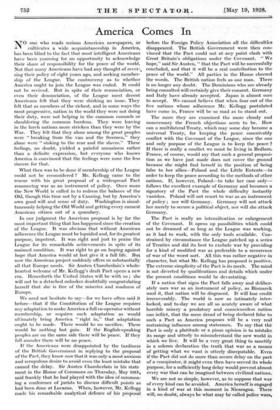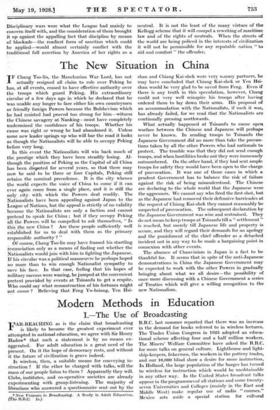America Comes In
NO one who reads serious American newspapers, or cultivates a wide acquaintanceship in America, has been blind to the fact that most intelligent Americans have been yearning for an opportunity to acknowledge their share of responsibility for the peace of the world. Not that many Americans have had any thought of revel..., sing their policy of eight years ago, and seeking member- ship of the League. The controversy as to whether America ought to join the League was ended. It could not be revived. But in spite of their renunciation, or even their denunciation, of the League most decent Americans felt that they were shirking an issue. They felt that as members of the richest, and in some ways the most progressive, nation in the world they were not doing their duty, were not helping in the common counsels or shouldering the common burdens. They were leaving in the lurch nations more stricken than they were by the War. They felt that they alone among the great peoples were " breaking from the van .and the freemen," they alone were " sinking to the rear and the slaves." These feelings, no doubt, yielded a painful uneasiness rather than a definite expression, but everyone who knows America is convinced that the feelings were none the less sincere for that.
What then was to be done if membership of the League could not- be reconsidered ? Mr. Kellogg came to the rescue with his great proposal of a widespread Pact renouncing war as an instrument of policy. Once more -the New World is called in to redress the balance of the Old, though this time not by a Canning, but by America's own good will and sense of duty. Washington is simul- taneously helping the Old World and getting every earnest American citizen out of a quandary.
In our judgment the American proposal is by far the most important thing that has happened since the creation Of the -League. it was obvious that without American adherence the League must be lopsided and, for its greatest purpose, impotent. It was right and just to praise the League for its remarkable achievements in spite of its maimed condition. It was right to go on hoping against hope that America would at last give it a full life. But now the American project suddenly offers us substantially all that Europe needs. Sir Austen Chamberlain's whole- hearted welcome of Mr. Kellpgg's draft Pact opens a new era. Henceforth the United States will be with us ; she will not be a detached onlooker doubtfully congratulating herself that she is free of the miseries and madness of Europe.
We need not hesitate to say—for we have often said it before—that if the Constitution of the League requires any adaptation to make America a full co-operator without membership, or requires such adaptation as would ultimately bring America " right in," that adaptation ought to be made. There would be no sacrifice.- There would be nothing but gain: If the English-speaking peoples are on the mine side there will be -peace. If they fall asunder there will be no peace. - If the Americans" were disappointed by the tardinea of the British Government in replying" to the proposal- of the Pact, they know now that it was only 'a most "anxious and scrupulous desire to avoid even the least mistake that caused the delay. Sir Austen Chamberlain in his state ment in the House of Commons on Thursday, May -10th, said frankly that he had played with the idea Of summon- ing a conference of jurists to discuss difficult points as had been done at Locarno. When; however; Mr. Kellogg made -his remarkable analytical defence of his proposal before the Foreign Policy Association all the difficulties disappeared. The British Government were then con- vinced that the Pact could not at-any point clash with Great Britain's obligations under the Covenant. " We hope," said Sir Austen, " that the Pact will be successfully concluded, and that it will be a real contribution to the peace of the world." All parties in the House cheered the words. The British nation feels as one man. There is no longer any doubt. The Dominions who -are already being consulted will certainly give their consent. Germany and Italy have- already accepted. Japan is almost sure to accept. We cannot believe that when four out of the five nations whose adherence Mr. Kellogg postulated have come in, France will be so mad as to stand out. - The more they are examined the more cloudy and unnecessary the French objections seem to be. How can a multilateral Treaty, which may some day become a universal Treaty, for keeping the peace conceivably conflict with the Covenant of the League, since the one and only purpose of the League is to keep the peace ? If there is really a conflict we must be hiring- in Bedlam: France, of course, would say that such a general proposi- tion as we have just made does not cover the ground because she might find herself in the position of -being false to her allies—Poland and the Little Entente—in order to keep the peace according to the methods of other nations. If, however, Poland—to take her case only-- follows the excellent example of Germany and -becomes a signatory of the Pact the whole difficulty instantly vanishes. Poland-will not resort to war as an instrument of policy ; nor will- Germany. Germany will not attack her merely to secure a political object, nor will she attack Germany.
The Pact -is really an intensification or enlargement: of the Covenant. It opens up possibilities which could not be dreamed of so long as the League was working, as it had to work, with the only tools available. Con-. strained by circumstance the League patched up a series of Treaties and did its best to exclude war by providing for a kind of modified war as preferable to a recurrence of war of the worst sort. All this was rather negative in character, but what Mr. Kellogg has proposed is positive: The extreme simplicity of the Pact is its merit. The mind is not diverted by qualifications and details which under the present conditions would be devastating.
If a nation that signs the Pact falls away, and deliber, ately uses War as an instrument of policy,- as Bismarck used it, that nation will be disgraced. It will lose credit irrecoverably. The world is now so intimately- inter- locked; and to-day we are all so acutely aware -of what horrible misery a predatory and conscienceless nation" can-inflict, that the mere dread of being declared false to such a Pact as America proposes will be a very real restraining influence among statesmen. To say that the- Pact is only a platitude or a pious opinion is to mistake_ its range and utterly to misunderstand the new world in which we live.- It will be a very great thing to sanctify in a .solemn declaration the truth that war as a means of getting what we want is utterly disreputable. Even if the Pact did not do more than secure delay on the part of a conspirator, it might-even then haire served its whole purpose,- for a sufficiently long delay would prevent almost every war that can be imagined between civilized nations.
We are not so simple, however, as to suppose that war of every kind can be avoided. America herselfis engaged in a kind of war at this moment in Nicaragua. There will, -no doubt, always be what may be called police wars, Disciplinary wars were what the League had _mainly to concern itself with, and the consideration of them brought it up against the appalling fact that discipline by means of blockade—the readiest form of sanction which could be applied—would almost certainly conflict with the traditional full assertion by America of her rights as a neutral. It is not the least of the many virtues of the Kellogg scheme that it will compel a rewriting of maritime law and of the rights of neutrals. When the streets of the world are being policed in the interests of civilization it will not be permissible for any reputable nation " to aid and comfort " the offender.



































 Previous page
Previous page